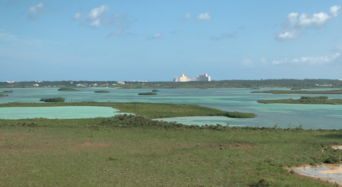The Bahamas is a low-lying archipelagic nation directly in the hurricane corridor and is deeply invested in avoiding devastation by increasingly forceful hurricanes and generations of Bahamians fleeing its shores as climate refugees.
Its Prime Minister addressed COP 27 and made a simple request of world leaders confronting the climate crisis: "Let's Get Real". In this article, we explore how the Bahamas is promoting a green agenda through green initiatives, blue carbon initiatives, and carbon trading.
Climate Finance
Climate finance refers to the financing needed to tackle climate change and to support the transition to a low-carbon and climate-

resilient economy. The importance of climate finance has grown as climate change has become a pressing issue, affecting economies, societies, and ecosystems worldwide. Financial centers must play an active role in green and sustainable finance. Financial centers are the locations where the demand for and supply of finance come together, and green and sustainable financial services will need to be scaled up across banking, capital markets, fintech, insurance, and investment. The Bahamas, with its strong financial centre, has recognised the importance of green and sustainable finance and has been actively participating in climate finance initiatives.
Green and Blue Economies
One of the areas where The Bahamas is participating in climate finance is through the development of green initiatives. Green initiatives refer to activities that reduce greenhouse gas emissions and support the transition to a low-carbon economy. The Bahamas has been working to promote green initiatives in various sectors, such as renewable energy, energy efficiency, and sustainable transportation. The National Investment Funds Act, 2023, which provides the legal architecture for the creation of one or more National Investment Funds owned by the Government of The Bahamas, provides that an NIF may be established for a project related to the blue, green or orange economy.
The Bahamas has also been participating in blue carbon initiatives. Blue carbon refers to the carbon stored in coastal and marine ecosystems, such as mangroves, seagrasses, and salt marshes. These ecosystems sequester carbon dioxide from the atmosphere and store it in their biomass and sediments. Protecting and restoring these ecosystems can help to mitigate climate change by

reducing greenhouse gas emissions and promoting carbon sequestration. An article published in the National Geographic notes that that The Bahamas is home to 25,000 square miles of sea grass.
These lush seagrass meadows found on the floor of the ocean host a multitude of sea life. According to the World Wildlife Federation, seagrass is up to 35 times faster than tropical rainforests at capturing carbon, and absorbs 10% of the ocean's carbon annually.
The United Nations has recognized the importance of blue carbon in addressing climate change, stating that "Protecting and restoring coastal and marine ecosystems can provide significant climate benefits, including through the sequestration and storage of carbon."
Another area where The Bahamas is participating in climate finance is through developing a framework for both sovereign carbon credits and the registration of carbon exchanges and other carbon businesses. Carbon trading refers to the buying and selling of carbon credits, which represent a reduction in greenhouse gas emissions. Carbon trading can provide a financial incentive for countries and companies to reduce their greenhouse gas emissions and to invest in low-carbon technologies.
The United Nations has recognized the importance of carbon trading in addressing climate change, stating that "Carbon pricing mechanisms, such as carbon taxes and emissions trading schemes, can provide a powerful incentive for emissions reductions and can help to mobilize climate finance."
A Climate Finance Prioritizing Legislative Framework
The Carbon Market Initiatives Act, 2022 ("CMIA") facilitates the Bahamas' national carbon credit program. The Bahamas' unique topography consists of thousands of miles of mangroves which are more efficient at carbon capture than just about any other environment. The Prime Minister believes that The Bahamas possesses roughly $300M worth of carbon credits which the Government of The Bahamas can sell on carbon markets to assist with global sovereign and commercial carbon off-setting initiatives. The CMIA facilitates the mapping, verification, and eventual sale of such carbon credits, noting that they are sovereign assets which accrue to the Government of The Bahamas.
The Carbon Credit Trading Act, 2022 ("CCTA") provides a framework for registering carbon trading businesses in The

Bahamas, including carbon trading exchanges, carbon registries, and carbon credit verification bodies. Such exchanges may make available for trading carbon products, including digital asset linked carbon products, carbon securities, or carbon derivatives. Applicants desiring to be registered as a carbon trading registry must verify such products in accordance with the carbon trading principles set forth in the CMIA which references the Paris Accord. Verification must also be done following international standards by the International Accreditation Forum, or other accredited bodies determined by the Securities Commission of The Bahamas. The CCTA does not address other environmental assets, like rights to emit other pollutants (not just carbon dioxide) and water rights.
ESG Trends in The Bahamas
Environmental, Social, and Governance (ESG) is a rapidly growing trend in the investment industry. The idea of ESG is to incorporate non-financial factors into investment decision-making, such as climate change, labor practices, human rights, and corporate governance. ESG investing has grown in popularity in recent years, as investors look to align their values with their investment portfolios.
According to the Global Sustainable Investment Alliance, as of 2020, sustainable investments accounted for $35.3 trillion of assets under management, a 15% increase from 2018. This growth reflects the increased demand for ESG investing, with more investors looking to allocate their capital towards companies that are making positive social and environmental impacts.
The growth of ESG investing can be attributed to a few key factors. Firstly, there is increasing awareness of the negative impacts of climate change and environmental degradation on both society and the economy. Investors are recognizing the importance of considering these issues when making investment decisions.
Secondly, there is a growing demand for corporate accountability, particularly on issues such as executive compensation, diversity and inclusion, and human rights. Lastly, there is a growing body of research that suggests that companies with strong ESG practices can outperform their peers in the long run.
As ESG investing becomes more mainstream, investors are demanding more information on companies' ESG practices.
Companies that can provide transparent and accurate data on their ESG performance will be more attractive to investors.
While ESG investing has many benefits, there are also challenges associated with it. One challenge is the lack of standardization in ESG reporting. There are currently no universally accepted standards for ESG reporting, which can make it difficult for investors to compare companies' ESG performance. Another challenge is the potential for "greenwashing," which refers to companies making misleading claims about their ESG practices to attract investors.
Overall, ESG investing is a rapidly growing trend in the investment industry, and it is likely to continue to grow in importance in the coming years. As investors become more aware of the importance of non-financial factors in investment decision-making, companies that demonstrate strong ESG performance will be more attractive to investors.

However, there are also challenges associated with ESG investing, and it will be important for the industry to continue to develop standards and best practices to ensure that investors are able to make informed decisions.
Although many regulators have indicated that they intend to make ESG reporting a key part of their regulatory frameworks, The Bahamas still needs to take this step. In the interim, for investment funds registered in The Bahamas, the focus will likely be on ensuring that investment funds and managers employing ESG strategies and guidelines make material disclosures to investors on their strategy, allocation and ESG evaluation methods.
Conclusion
The Bahamas' unique position as an important financial centre and host of thousands of miles of carbon sinks make it well-positioned to facilitate environmental impact investing within a sound and compliant regulatory environment. The Bahamas' commitment to resolving the climate crisis is real - let's hope other nations heed our clarion call.
Article by Aliya Allen, Partner, Financial Services, Private Client, Trusts & Estates Practice Groups, Graham Thompson










